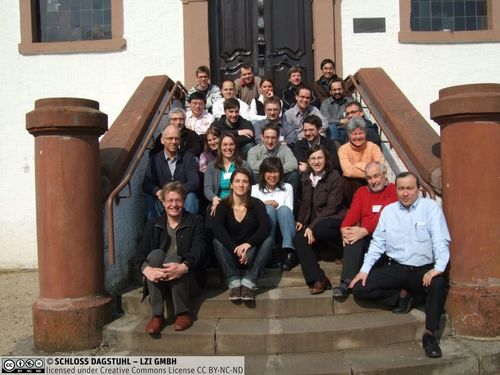Dagstuhl Seminar 10151
Enabling Holistic Approaches to Business Process Lifecycle Management
( Apr 11 – Apr 16, 2010 )
Permalink
Organizers
- Serge Abiteboul (ENS - Cachan, FR)
- Andreas Oberweis (KIT - Karlsruher Institut für Technologie, DE)
- Jianwen Su (University of California - Santa Barbara, US)
Coordinator
- Agnes Koschmider (KIT - Karlsruher Institut für Technologie, DE)
Contact
- Simone Schilke (for administrative matters)
Documents
Press/News
Press Reviews
- Effective Business Process Management
Wolfgang Back und Wolfgang Rudolph im Gespräch mit Prof. Andreas Oberweis
Process modeling tools and techniques are used in different phases of a business process management project. At the level of modeling, the basic formalisms proposed for modeling business processes, tend to focus very heavily on the side of process, without enabling equally rich modeling of the data and information that is being manipulated by the processes. More broadly, the research is largely independent of the overall lifecycle of business process management, including evolution of business processes over time, and design of business processes from already existing business processes.
The purpose of this seminar was to bring together a cross-disciplinary group of academic and industry researchers from the areas of Information Systems/Business Process Management, Service and Software Engineering, Semantic Technologies and Human Computer Interaction to foster a better understanding of how to manage the lifecycle of business process models, ranging from initial design, evolution, implementation, and monitoring. The primary emphasis was on paradigms and technologies that enable a more holistic perspective, including new modeling techniques, new conceptualizations and visualizations, applications of recommendation system and other social networking techniques, and more flexible implementations. While there have been a number of Dagstuhl Seminars focused on modeling issues pertaining to distinct phases of a modeling project, such as Process, Service or Software Engineering, there has not been a seminar to gather specialists from across several disciplines to study this lifecycle management challenge.
We believe that each of these technologies is separately important for advancing the state of the art in managing the lifecycle of business processes, and that a dramatic improvement can be obtained if the four areas work in a coordinated way.
- Serge Abiteboul (ENS - Cachan, FR) [dblp]
- Jörg Desel (FernUniversität in Hagen, DE)
- Alexander Dreiling (SAP Research - Brisbane, AU)
- Marlon Dumas (University of Tartu, EE) [dblp]
- Ulrich Frank (Universität Duisburg-Essen, DE) [dblp]
- Birgit Hofreiter (Hochschule Liechtenstein - Vaduz, LI)
- Oliver Kopp (Universität Stuttgart, DE) [dblp]
- Agnes Koschmider (KIT - Karlsruher Institut für Technologie, DE) [dblp]
- Steffen Mazanek (Universität der Bundeswehr - München, DE)
- Jan Mendling (HU Berlin, DE) [dblp]
- Andreas Oberweis (KIT - Karlsruher Institut für Technologie, DE) [dblp]
- Barbara Paech (Universität Heidelberg, DE) [dblp]
- Manfred Reichert (Universität Ulm, DE) [dblp]
- Hajo A. Reijers (TU Eindhoven, NL) [dblp]
- Wolfgang Reisig (HU Berlin, DE) [dblp]
- Stefanie Rinderle-Ma (Universität Wien, AT) [dblp]
- Munindar P. Singh (North Carolina State University - Raleigh, US) [dblp]
- Kenia Sousa (UC Louvain-la-Neuve, BE)
- Jianwen Su (University of California - Santa Barbara, US) [dblp]
- Piyawadee Sukaviriya (IBM TJ Watson Research Center - Yorktown Heights, US)
- Victoria Torres (Technical University of Valencia, ES) [dblp]
- Huy Tran (TU Wien, AT)
- Hagen Völzer (IBM Research GmbH - Zürich, CH) [dblp]
- Barbara Weber (Universität Innsbruck, AT) [dblp]
- Mathias Weske (Hasso-Plattner-Institut - Potsdam, DE) [dblp]
- Karsten Wolf (Universität Rostock, DE) [dblp]
- Christian Zirpins (KIT - Karlsruher Institut für Technologie, DE)
- Michael zur Muehlen (Stevens Institute of Technology - Hoboken, US) [dblp]
Classification
- data bases
- information retrieval
- modelling
- simulation
- semantics
- formal methods society
- human-computer interaction
- software engineering
- interdisciplinary
Keywords
- Business process modeling
- workflow management
- business artifact
- version and lifecycle management
- recommendation system
- HCI for design


